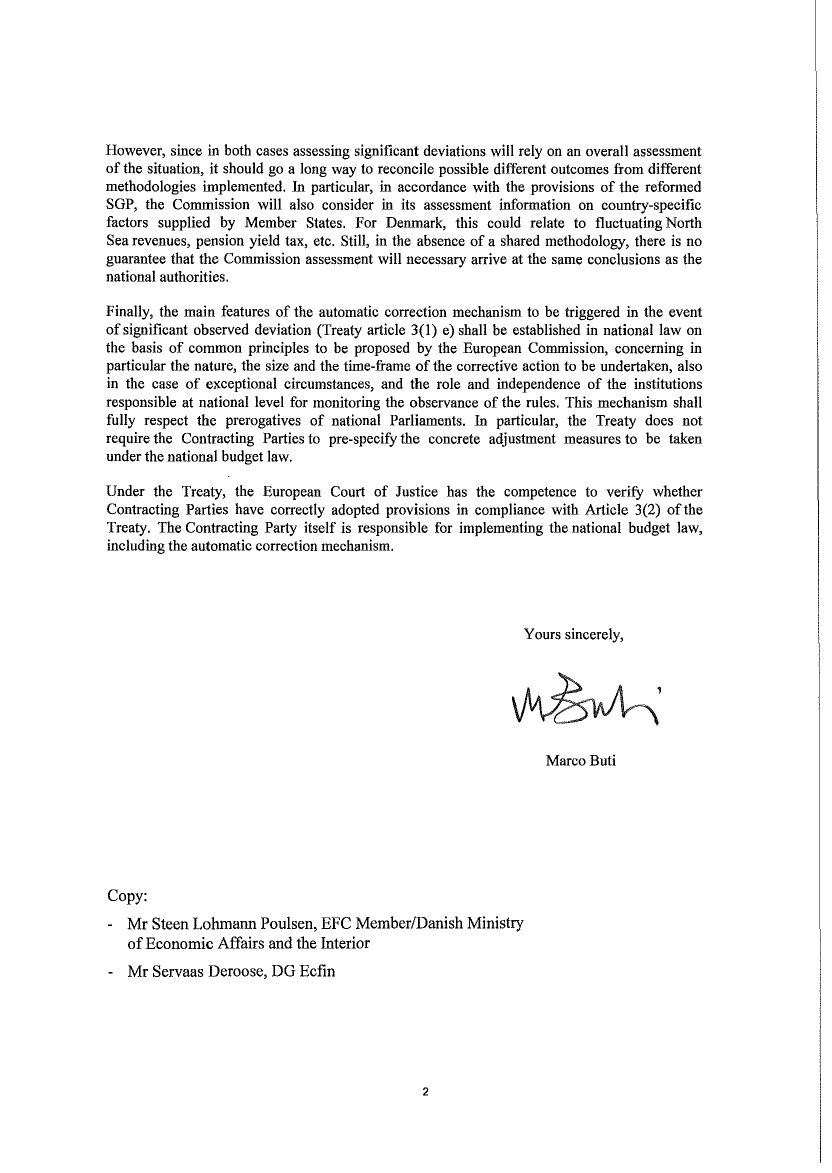Europaudvalget 2011-12
B 70
Offentligt
Ref. Ares(2012)116346 - 01/02/2012
EUROPEAN COMMISSIONDIRECTORATE GENERALECONOMIC AND FINANCIAL AFFAIRSThe Director General
Brussels,D(2012)
Dear Mr Hellemann,The Danish authorities requested clarification concerning the methodology to be used to estimatethe structural budget balance in the context of the Treaty on Stability, Coordinationand Governance in the Economic and Monetary Union and, in particular, in the context of theimplementation of the fiscal compact which requires the implementation at national level of abalanced budget rule.The present letter confirms the Commission Services understanding but does not represent anofficial position of the Commission and is without prejudice to any current or future provisionsof European Union law.The above mentioned Treaty does not provide fora specific method to be used by theContractmg Parties for calculating the structural budget balance, even though the medium termobjectives should be updated regularly on the basis of a commonly agreed method. Hence, theContractmg Parties could use their national estimates and methods for the assessment ofthe national budget law.At the same time, it should be recalled that in the context of the preventive arm of the revisedStability and Growth Pact (SGP), the Union surveillance framework already provides agreedoperational modalities and concepts as to how calculating structural budget balance. Inparticular, it defines what constitutes a "significant deviation" from the country-specificmedium-term budgetary objective (MTO) or the adjustment path towards it on the basis ofan "overall assessment with the structural balance as the reference, including an analysis ofexpenditure net of discretionary measures" will be done(cf. Regulation (EC) No 1175/2011amending Regulation 1466/97).It should be noted that while the Treaty is fully aligned to the language of the Stability andGrowth Pact and refers to the very same concepts of significant deviations and overallassessment (Title III (Fiscal Compact) of the Treaty), the Contracting Parties are not bound touse the common Union methodology for the calculation of structural balances. Therefore, therecould theoretically be divergences of methodologies used and thus diverging conclusions.
Mr David HellemannPermanent SecretaryMinistry of FinanceChristiansborg Slotplads 1DK - 1218 Copenhagen K
European Commission, B-1049 Brussels - Belgium. Telephone (switchboard): +32-2-299 1111.Office: BU24 3/83. Telephone (direct Eine): +32-2-296 22 46.
However, since in both cases assessing significant deviations will rely on an overall assessmentof the situation, it should go a long way to reconcile possible different outcomes from differentmethodologies implemented. In particular, in accordance with the provisions of the reformedSGP, the Commission will also consider in its assessment information on country-specificfactors supplied by Member States. For Denmark, this could relate to fluctuating NorthSea revenues, pension yield tax, etc. Still, in the absence of a shared methodology, there is noguarantee that the Commission assessment will necessary arrive at the same conclusions as thenational authorities.Finally, the main features of the automatic correction mechanism to be triggered in the eventof significant observed deviation (Treaty article 3(1) e) shall be established in national law onthe basis of common principles to be proposed by the European Commission, concerning inparticular the nature, the size and the time-frame of the corrective action to be undertaken, alsoin the case of exceptional circumstances, and the role and independence of the institutionsresponsible at national level for monitoring the observance of the rules. This mechanism shallfully respect the prerogatives of national Parliaments. In particular, the Treaty does notrequire the Contracting Partiesto pre-specify the concrete adjustment measures to be takenunder the national budget law.Under the Treaty, the European Court of Justice has the competence to verify whetherContracting Parties have correctly adopted provisions in compliance with Article 3(2) of theTreaty. The Contracting Party itself is responsible for implementing the national budget law,including the automatic correction mechanism.
Yours sincerely,
Marco Buti
Copy:Mr Steen Lohmann Poulsen, EFC Member/Danish Ministryof Economic Affairs and the InteriorMr Servaas Deroose, DG Ecfin


